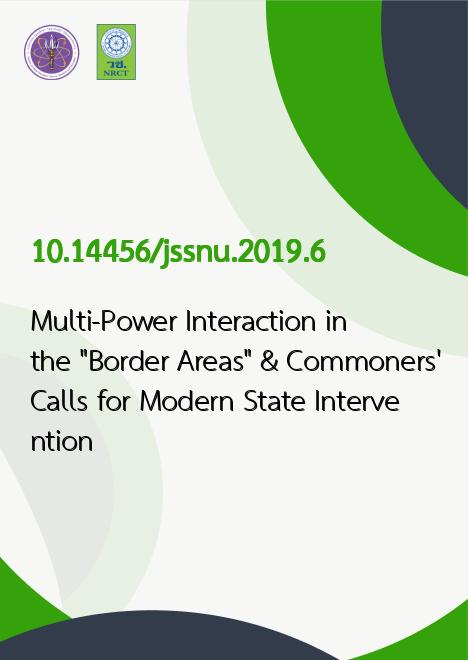
|
Multi-Power Interaction in the "Border Areas" & Commoners' Calls for Modern State Intervention |
|---|---|
| รหัสดีโอไอ | |
| Creator | Nattaphong Sakul-leaw |
| Title | Multi-Power Interaction in the "Border Areas" & Commoners' Calls for Modern State Intervention |
| Publisher | คณะสังคมศาสตร์ มหาวิทยาลัยนเรศวร |
| Publication Year | 2562 |
| Journal Title | วารสารสังคมศาสตร์ มหาวิทยาลัยนเรศวร |
| Journal Vol. | 15 |
| Journal No. | 1 |
| Page no. | 139 |
| Keyword | Commoner, Northern Principalities, Siam's Modern State, Reformation. |
| URL Website | http://www.jssnu.socsci.nu.ac.th |
| Website title | วารสารสังคมศาสตร์ มหาวิทยาลัยนเรศวร |
| ISSN | 1686-9192 |
| Abstract | In the early Rattanakosin era, Northern Principalities were a broad border area that Bangkok entrusted to police either the common phrai not to escape from its grips or the outsider not to intrude its inner territory. Foreigners coming to Siam with the purpose of trade were allowed to conduct their exchanges only within specific border principalities. The situation, however, was changed after Siam signed the Bowring Treaty in 1855, obliging Siam to grant extraterritorial rights to foreign aliens and allow these merchants to trade freely in any areas of their wishes. Northern Principalities then became a trade entrep?t of Thai, Chinese and the British subjects that were frequently travelling to trade in the area. Due to such context, the Northern Principalities were a place of interactions, conflicts, and negotiations among commoners of various groups and statuses, for instance the network of powerful local governors and local authorities, authorized tax agencies, and foreigners, particularly the Chinese and the Karen (Tong-su) registered as the British subjects, and including other indigenous commoners who were not affiliated with the Sakdina system and were involved in small-scale trading of their own. Conflicts among various groups with multiple statuses in the commercial space weakened and undermined the local administration of Sakdina system. Local authorities could no more handle this problem and tended to violate the law themselves. Commoners thus questioned the existing administrative structure and mechanism and increasingly called for the power of central government under the authority of the Bangkok court to intervene in these conflicts by enforcing civil and criminal regulations. Arguably, the calls of commoners corresponded with the demands of the Bangkok court to replace local authorities with a "modern" bureaucracy. Thus, the establishment of modern bureaucracy that would finally institutionalize the absolute monarchy was not only far-sightedly led by nobles and elites in Bangkok, but also coincided with demands from below made by commoners. Popular consensus was therefore decisive in establishing modern state bureaucracy in the region. |